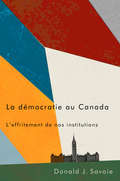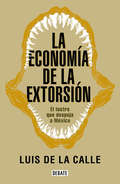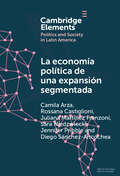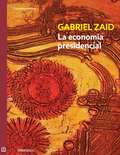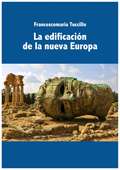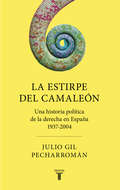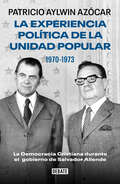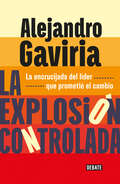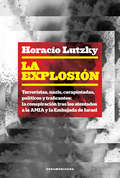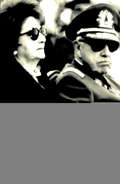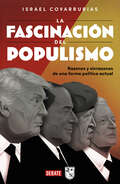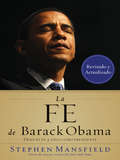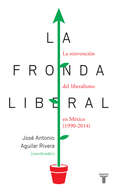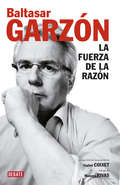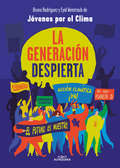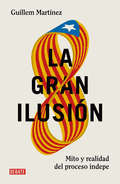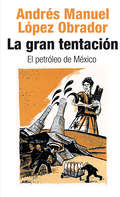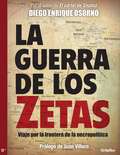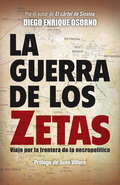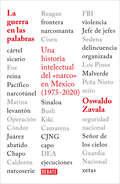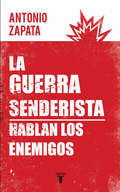- Table View
- List View
La démocratie au Canada: L'effritement de nos institutions
by Donald J. SavoieLa démocratie représentative canadienne se heurte à de grandes difficultés. Au sommet de leur liste figure l'incapacité croissante du gouvernement national à remplir ses rôles les plus essentiels, soit planifier des actions collectives qui ont un écho dans toutes les régions, en plus de mettre ces mesures en application. Parmi les autres difficultés, on peut mentionner l'incapacité du Parlement à assumer d'importantes responsabilités, un appareil judiciaire militant, des appels incessants à une plus grande transparence, l'évolution rapide du rôle des médias et une bureaucratie du gouvernement fédéral qui a perdu à la fois son chemin et son influence. Soutenant que les Canadiens doivent réexaminer les origines de leur pays s'ils veulent comprendre pourquoi il est difficile de changer et pourquoi ils continuent à adhérer aux identités régionales, Démocratie au Canada explique en quoi les expériences historiques britanniques ont façonné les institutions nationales canadiennes et pour quelle raison on s'est peu efforcé d'intégrer des réalités canadiennes à l'amalgame. Par conséquent, l'ampleur et la taille du gouvernement et du fédéralisme canadiens ont évolué principalement en dehors de la Constitution. Le Parlement et même le Cabinet désormais ont été mis à l'écart, laissant la voie libre aux responsables des orientations politiques pour concevoir et gérer l'État moderne. Cela explique également la conviction des citoyens ordinaires que les institutions nationales répondent aux besoins des élites économiques, de leurs propres membres et des groupes d'intérêt à leurs propres dépens. Analyse magistrale, La démocratie au Canada examine les forces qui façonnent les rouages du fédéralisme canadien et des institutions politiques et démocratiques nationales du pays.
La economía de la extorsión: El lastre que despoja a México
by Luis De la CalleLa extorsión no es sólo una mancha en nuestro sistema. Es nuestro sistema. O, al menos, el peor compañero de viaje posible: uno que nos despoja a cada paso y nos sumerge en la incertidumbre. La extorsión no es sólo una mancha en nuestro sistema. Es nuestro sistema. O, al menos, el peor compañero de viaje posible: uno que nos despoja a cada paso y nos sumerge en la incertidumbre. En México, extorsiona el viene-viene para #cuidar# el coche, extorsiona el líder sindical al amenazar con huelgas a mansalva, extorsiona el burócrata que exige una #ayuda# para destrabar un trámite, extorsiona el gerente de una trasnacional al pedir moches, extorsiona el político que solicita un porcentaje para soltar una concesión... La extorsión permeó en prácticamente todas las capas de nuestra sociedad y hoy define buena parte de nuestra economía y nuestras políticas. Su impacto es brutal y causa una profunda desigualdad, no sólo en ingresos y oportunidades, sino en el acceso a los derechos más básicos. México, hoy, no se entiende sin este flagelo. Con todo rigor, Economía de la extorsión desmenuza el problema, nos presenta todas sus facetas y nos alerta del futuro que nos espera de seguir por esa vía.
La economía política de una expansión segmentada: Política social latinoamericana en la primera década del siglo XXI (Elements in Politics and Society in Latin America)
by Camila Arza Rossana Castiglioni Juliana Martínez Franzoni Sara Niedzwiecki Jennifer Pribble Diego Sánchez-AncocheaLos primeros años del siglo XXI fueron un período de expansión de la política social en América Latina. Se crearon nuevos programas en salud, jubilaciones y pensiones, y asistencia social, y se incorporaron grupos previamente excluidos de las políticas existentes. ¿Cuál fue el carácter de esta expansión de la política social? ¿Por qué experimentó la región esta transformación? A partir de una revisión de un amplio número de artículos y libros, mostramos que los avances de la política social en la primera década del siglo XXI se mantuvieron segmentados, con diferencias en los niveles de acceso y beneficio, brechas en la calidad de los servicios y disparidad entre los sectores de política. Argumentamos que esta “expansión segmentada” fue el resultado de una combinación de características de la democracia a corto y largo plazo, condiciones económicas favorables y legados de política. El análisis revela que quienes estudian la política social latinoamericana han generado nuevos conceptos e importantes teorías que propician nuestra comprensión de las constantes preguntas sobre el desarrollo y el cambio del estado de bienestar.
La economía presidencial
by Gabriel Zaid"El desastre económico acumulado no tuvo como origen los genes supuestamente ineptos, perezosos y corruptos de los mexicanos. Tampoco la adversidad, ni la maldad extranjera. Se fue gestando por una solución política que se volvió un problema económico." La economía mexicana padeció los excesos del presidencialismo que todavía estamos pagando. La nueva era económica fue inaugurada por Luis Echeverría al declarar que las finanzas se manejan desde Los Pinos. Así fue, y así nos fue. Esta nueva edición cubre el ciclo completo de la economía presidencial: desde Echeverría hasta Zedillo (1970-2000), con referencias obvias a la situación actual.
La edificación de la nueva Europa
by Francescomaria TuccilloReporte político que trata sobre el futuro de Europa y una pequeña historia de su intento de unión.
La estirpe del camaleón: Una historia política de la derecha en España (1937-2004)
by Julio Gil PecharrománPara entender nuestro presente, un libro sobre la evolución de las distintas corrientes políticas de la derecha española desde la formación del Movimiento hasta el final del aznarismo. Este libro estudia la evolución de unas «derechas» de naturaleza muy variada y cambiante, con proyectos políticos y sociales frecuentemente contrapuestos, pero que han compartido dos características generales: el nacionalismo identitario y un concepto moral del orden social entendido genéricamente como «confesionalidad católica» o bien, desde un planteamiento distinto, como «humanismo cristiano». La derecha española ha desarrollado, desde 1937 hasta 2004, procedimientos de «destrucción creativa» en la evolución de su sistema de partidos, disolviendo sin grandes problemas aquellas de sus organizaciones que resultaban ya disfuncionales -el Movimiento Nacional, la Unión de Centro Democrático, Alianza Popular, etcétera- y sustituyéndolas con otras que rescataban a su personal político y a sus votantes, pero bajo una pragmática modificación de programas y modelos organizativos para ajustarlos a las nuevas condiciones del mercado electoral. Un sistema que requiere capacidad camaleónica para, en el más breve plazo, transformar estructuras, crear nuevos líderes, adaptar doctrinas a la modernidad y lavar pasados personales, o jubilar a los poseedores de pasados ahora impresentables. La crítica ha dicho...«Incluye al mismo tiempo que amplía: [...] una ambiciosa obra de síntesis, escrita en un lenguaje divulgativo, con cierta intención analítica [...] y el propósito de organizar de algún modo y dar sentido a una realidad tan variada.»Óscar R. Buznego, La Nueva España - Cultura
La experiencia política de la Unidad Popular 1970-1973: La Democracia Cristiana durante el gobierno de Salvador Allende
by Patricio Aylwin Azócar"Me interesa aportar al juicio de la historia la mirada ya lejana de las razones de nuestras acciones, los dilemas que debimos enfrentar y las decisiones que tomamos en un momento trágico de Chile". Durante el verano de 1974, Patricio Aylwin, hasta hace algunos meses presidente del Senado y líder de la Democracia Cristiana, comenzó a redactar las primeras páginas de un libro que pudiera dar cuenta de cómo fue vivir el periodo que va desde 1970 al 11 de septiembre de 1973. El peso de la responsabilidad de preguntarse sobre lo acontecido llevó al autor de este libro, a medio camino entre memoria histórica y crónica política, a indagar de manera más detallada en el conjunto de acontecimientos -políticos, económicos y sociales- que culminaron en el golpe de Estado. El proyecto fue interrumpido y retomado a lo largo de los años -en los ochenta, en los noventa e incluso durante la década recién pasada-, de modo que su autor pudo recopilar, durante cuatro décadas, documentos indispensables para "armar lo que pretendía fuera un análisis documentado del rol que tuvo la Democracia Cristiana en el gobierno de la Unidad Popular". La experiencia política de la Unidad Popular es una obra monumental que aborda en detalle -y bajo la minuciosa mirada de un protagonista privilegiado- el periodo en cuestión, sobre todo, el rol que jugó la Democracia Cristiana durante los primeros meses del gobierno de Salvador Allende, la crítica a los excesos de la izquierda revolucionaria, el papel de las Fuerzas Armadas en la política, el problema agrario, la virulencia en el espacio público, la paralización de octubre de 1972, las implicancias de la derrota electoral de 1973 y otros episodios alucinantes como la mítica conversación entre el autor y el presidente Allende mediada por el cardenal Raúl Silva Henríquez pocos días antes de la tragedia. Un libro indispensable y un documento histórico que aporta valiosa información con la cual revisitar, medio siglo después, los años de la vía chilena hacia el socialismo.
La explosión controlada: La encrucijada del líder que prometió el cambio
by Alejandro GaviriaEntre las memorias políticas, la crónica y el ensayo, este libro revelador da luces sobre el primer año de gobierno de Gustavo Petro Al cumplirse el primer año del gobierno de Gustavo Petro, Alejandro Gaviria presenta en este ensayo, a modo de memorias políticas, su visión del presidente, así como sus reflexiones sobre los retos y las posibilidades de transformación que había encarnado el candidato de izquierda tras el estallido social de los años recientes. Este testimonio honesto y lúcido no es solo la visión de un economista, de un político escéptico, de un exministro, de un liberal pragmático, es también la esencia del pensamiento de un humanista que entiende que el cambio necesario de la sociedad requiere algo mucho más práctico que la férrea voluntad y la trampa retórica que caracterizan a Petro. "No pretendo hacer predicciones sobre el futuro de Colombia. Tampoco quiero hacer juicios definitivos. Quiero ofrecerles a los lectores una reflexión sobre un país en la encrucijada desde una perspectiva peculiar, privilegiada en un doble sentido: la perspectiva de alguien que estuvo adentro (en el vientre de la ballena, por decirlo de algún modo), que tuvo un conocimiento de primera mano de los asuntos de gobierno, y que al mismo tiempo ha pasado buena parte de su vida inmerso en las ciencias sociales, en la discusión (que nunca termina porque no hay respuestas definitivas) sobre las posibilidades y los obstáculos de la transformación social y cultural de la sociedad colombiana". Tomado de la introducción
La explosión: la conspiración tras los atentados a la AMIA y la Embajada de Israel
by Horacio LutzkyEl encubrimiento de los servicios de inteligencia de varios gobiernos, los más altos funcionarios del poder político argentino de los años 90, agentes de la SIDE y de la Policía Federal de los atentados a la Embajada de Israel y la AMIA. Aburrida en una guardia inmobiliaria, una mujer encuentra en un placard un impreso con información comprometedora sobre el atentado a la AMIA ocurrido en Buenos Aires en 1994. El título la estremece: Expediente bomba: el Irán-Baires-Bosnia-gate. Bajo el formato de una ficción, Horacio Lutzky, coautor del exitoso Iosi. El espía arrepentido, narra la trama secreta que terminó en la voladura de la mutual judía y las razones del encubrimiento del atentado. La explosión es el relato de una investigación escalofriante que, en el contexto de la guerra de los Balcanes, revela los hilos del contrabando de armas y explosivos en el que participaron traficantes y terroristas sirios, agentes iraníes, criminales de guerra nazis, importantes autoridades políticas y comunitarias argentinas, militares e integrantes de las fuerzas de seguridad, y algunos jueces, con el visto bueno de políticos y dirigentes israelíes y estadounidenses.
La familia
by Claudia Farfán y Fernando VegaComo en una tragedia shakespeariana esta investigación periodística dacuenta del auge y la caída de una familia que alcanzó el poder absolutoy que se despeñó definitivamente con la revelación de las cuentassecretas del general en el extranjero. Los autores se adentran en lavida privada de este clan que tejió su futuro en estrecha relación conel padre, del que sus miembros no quisieron ni pudieron separarse. Enuna mirada profunda, el relato contribuye a comprender las razones quellevaron a los Pinochet a aferrarse al poder durante diecisiete años.Como telón de fondo planea sobre estas páginas el fantasma de Piedad, lamujer ecuatoriana por quien el dictador estuvo dispuesto a romper sumatrimonio y cuya existencia fue uno de los secretos mejor guardados porla familia. Un libro sorprendente sobre la ambición y la fragilidadhumanas.
La fascinación del populismo: Razones y sinrazones de una forma política actual
by Israel CovarrubiasLas razones y sinrazones de una forma política actual El populismo es una de las patologías políticas contemporáneas más relevantes para el estudio empírico de las dinámicas del poder. La imagen que evoca nos lleva de inmediato a personajes polémicos como Donald Trump, Vladimir Putin, Beppe Grillo, Evo Morales, Nicolás Maduro, Hugo Chávez, Cristina Kirchner, Rafael Correa, Andrés Manuel López Obrador, entre otros. Pero también aformaciones partidistas como Podemos y Vox en España, el Movimiento 5 Stelle en Italia o Morena en México; así como a fenómenos inéditos como el Brexit en Inglaterra o el surgimiento del activismo nativista armado en Estados Unidos. El campo histórico de su desarrollo es amplio. Con la intención de sobrepasar el uso convencional o «de moda» que el conceptoconvoca en el terreno académico y más allá de él, Israel Covarrubias —doctor en ciencia política y autor de Maquiavelo. Una guía contemporánea de lectura sobre lo político y el Estado— presenta este ensayo en el que pone a discusión algunosde los efectos que ha tenido el ascenso del populismo para la democracia. Recorre desde los orígenes y el significado del término, los usos políticos de esa ideología, la construcción de esa identidad populista hasta casos contemporáneos de Europa, América Latina y Estados Unidos. Basado en las herramientas que nos ofrece la teoría política, La fascinación del populismo es una lectura amplia de uno de los fenómenos políticos más debatidos en los últimosaños que nos permitirá entender las líneas generales de los populismos «realmente» existentes en el actual concierto de naciones.
La fe de Barack Obama
by Stephen MansfieldLas elecciones del 2008 ahora son solo un recuerdo, pero ¿qué pasó con todas las promesas que le hizo Barack Obama al pueblo estadounidense?En este libro revisado y actualizado, Stephen Mansfield profundiza una vez más en la controversial fe del presidente Obama. Con dos nuevos capítulos dedicados a los primeros dos años de esta histórica presidencia, Mansfield continúa su exploración en la fe de Obama sin inclinaciones políticas o religiosas.
La fronda liberal: La reinvención del Liberalismo en México (1990/2014)
by José Antonio Aguilar RiveraUna reflexión a varias voces sobre una de las tradiciones políticas más importantes y soslayadas de México: el liberalismo. ¿Qué es el liberalismo y cómo se ha entendido y operado en México? Éste es el punto de partida de La fronda liberal, un libro conformado por casi una treintena de ensayos escritos por algunas de las plumas más comprometidas con el devenir y la investigación política y social de nuestro país. El liberalismo en México y Latinoamérica es un tema polémico en sí mismo, que enfrenta mitos, dogmas y lugares comunes, pero pocas veces discutido con la objetividad y el rigor intelectual que merece. Este libro busca subsanar esa falta. La fronda liberal ofrece un panorama amplio y diverso sobre un asunto que, por su propia naturaleza, debe ser abordado desde la pluralidad. Autores como Alonso Lujambio, Carlos Elizondo, Federico Reyes Heroles, José Ramón Cossío, José Woldenberg, Luis Villoro y SoledadLoaeza trazan la ruta del liberalismo en México, atendiendo a sus vertientes históricas, políticas, sociales, económicas, culturales, jurídicas, biográficas y filosóficas. Los textos del libro van del ensayo de largo aliento a la nota periodística, pero todos se ocupan del tema con profundidad. La fronda liberal dibuja la anatomía de un concepto indispensable para comprender nuestra realidad y, sobre todo, para trazar perspectivas de futuro.
La fuerza de la razón
by Baltasar GarzónUna larga entrevista del gran escritor gallego Manuel Rivas a Baltasar Garzón sobre el acoso que ha padecido y que le ha acabado expulsando de la Audiencia Nacional. Este libro es el resultado de un ofrecimiento, una colaboración y un deseo. Isabel Coixet se ofreció a filmar un documental, Manuel Rivas accedió a colaborar y Baltasar Garzón quiso hablar por primera vez de la situación por la que estaba pasando, y de toda su trayectoria. Al presentar esa entrevista, ampliada y actualizada, La fuerza de la razón es un documento fundamental para entender la historia reciente de la justicia en España, desde la operación Nécora al caso Gürtel, pasando por la liberación de Ortega Lara o la detención de Pinochet, y para comprender el modelo de justicia que se pretende imponer y por qué se quiere apartar de su labor a una de las figuras más destacadas de la España democrática. «Creo que la fuerza de la razón, frente a la razón de la fuerza, siempre debe imponerse sobre cualquier tentación de los que disponiendo del poder, lo utilizan arbitrariamente.»
La fuerza de las ideas: La impronta del Estado Batllista en la identidad nacional
by Julio María SanguinettiEl Dr. Julio María Sanguinetti, con precisión de historiador y su oficio periodístico, aporta con este libro un nuevo mojón a su propuesta de comunicar a las nuevas generaciones las batallas de ideas que han configurado el Uruguay de hoy. El Uruguay suele ser reconocido en Latinoamérica por su sólida democracia y sus pioneros avances en derechos sociales, económicos y culturales. Le distingue también un singularísimo republicanismo laico. Habiendo gobernado dos tercios de la historia nacional, el Partido Colorado le ha impreso, a su institucionalidad, rasgos fundamentales que ya están incorporados a su identidad, a su ADN. Es lo que comúnmente se llama Estado Batllista, centro permanente de los debates y controversias públicas. La ética de la responsabilidad, la laicidad republicana, el feminismo, la garantía de la libertad de expresión, la educación como herramienta para el desarrollo, el concepto de solidaridad social, el internacionalismo, son aspectos claves de las ideas que el Partido Colorado incorporó a su vida democrática.
La fábrica de canallas
by Chris KrausLa última revelación literaria de Alemania: «una grandísima novela» (Le Monde) que retrata el declive de una época y el advenimiento de una nueva era. En la línea de Las benévolas, de Jonathan Littell, La fábrica de canallas es una novela que excede todos los límites, un magnífico fresco histórico y familiar que retrata los años más sombríos del siglo XX. En 1974, en un hospital bávaro, Koja Solm, un anciano con una bala alojada en la cabeza, decide contarle su vida a su compañero de habitación, un joven hippie y pacifista. A través de episodios entrelazados, desde Riga a Tel Aviv, pasando por Auschwitz y París, La fábrica de canallas nos lleva a zonas donde la moral y la integridad son ultrajadas con violencia para contarnos cómo fue todo al final de la Segunda Guerra Mundial. La crítica ha dicho...«Una obra maestra cautivadora. Un libro fascinante, de gran poder visual y emocionante. Extraordinario.»Focus «Como una serie: ritmo trepidante, giros argumentales y personajes intrigantes. ¡Genial!»Die Zeit «Manejada con una brillantez poco común, esta novela trata de una metamorfosis monstruosa, la que convierte a un hombre en nazi.»Transfuge «Excepcional. Una historia sensacional, magníficamente contada.»Neue Züricher Zeitung «Un gran escritor.»MDR «¡Sublime!»Madame «¡Una auténtica obra maestra!»Neon «Un retrato magistral de las profundidades morales de la política, el amor y la sociedad del siglo XX.»Donna «Un retrato excepcional de la pasada centuria.»Augsburger Allgemeine ¡Una trepidante saga familiar!»Hörzu «Un narrador nato.»Süddeustche Zeitung «Imprescindible.»Deustchlandradio Kultur «Una obra de arte.»Berliner Morgenpost «¡La mejor novela que he leído en los últimos años!»SWR «Se lee de un tirón.»Der Tagesspiegel «Una novela río que acarrea todas las sombras de la historia.»L'Express «Fresco histórico, relato de espías, fábula política; en este laberinto literario, uno se pierde con deleite.»Lire
La generación despierta
by Bruno Rodríguez Eyal WeintraubBruno Rodríguez y Eyal Weintraub, cofundadores de la agrupación ambiental Jóvenes por el clima, parte del movimiento Fridays for Future creado por Greta Thunberg, comparten su visión sobre la crisis climática y analizan el rol vital de la juventud en la construcción de un nuevo paradigma que permita imaginar un futuro distinto en el planeta. En el año 2019, los jóvenes Bruno Rodriguez y Eyal Weintraub, recién salidos del colegio secundario, observaron lo que la huelga de Greta Thunberg en Suecia estaba generando a nivel global y entendieron que había que poner manos a la obra. La agrupación que fundaron, Jóvenes por el clima, es hoy una referencia ineludible en el movimiento ambiental argentino. Son audaces, son irreverentes y no se callan nada. Este libro es un análisis fulminante de los factores que condujeron a la situación crítica que hoy amenaza la vida en el planeta. Es también una reflexión política profunda, que pone el foco en las desigualdades y denuncia la inacción de los gobiernos. Y es sobre todo una reivindicación de la utopía y del espíritu transformador que puede guiarnos en la creación de un futuro distinto.
La gran estafa: Veinte años de privatizaciones en la Argentina
by Marcelo PelaezEste libro pone la lupa sobre las empresas de servicios públicos cedidaspor el Estado al capital privado y hace foco en la trama urdida entregobernantes y la comunidad de negocios para engañar a la sociedad enbase a aquel ilusorio y mendaz slogan que afirmaba que con lasprivatizaciones los argentinos íbamos a vivir mejor. La tragedia de Once y los prolongados apagones no son hechos aisladossino la devastadora consecuencia de una política de privatizaciones queprometió mejorar los servicios públicos y la calidad de vida de lapoblación. Sin embargo, todo fue peor. La realidad de unas prestacionesdeficientes, al límite de parámetros mínimos de seguridad y con muyprecario mantenimiento es tangible para millones de argentinos estafadosy transformados en rehenes indefensos de compañías "blindadas" por lainacción de los entes reguladores. Subsidios que no van a inversiones yun Estado que no controla en qué usan los fondos públicos las empresasconcesionarias son apenas dos ingredientes de un cóctel explosivo que yase cobra víctimas. A poco más de veinte años de iniciado este proceso,un ensayo de actualidad periodística sobre el impacto de las vergonzosasprivatizaciones en la vida cotidiana de los argentinos.
La gran ilusión: Mito y realidad del proceso indepe
by Guillem MartínezUn libro que demuestra que el Procés Independentista no existe y que todos hemos sido víctimas de una gran ilusión fomentada por los partidos que han participado en la animación o condena del proyecto. Una visión heterodoxa de los acontecimientos acaecidos en los últimos años en Cataluña. El Procés Català es un tema tratado por la prensa madrileña y catalana de manera tendenciosa y poco clara, donde han primado más los puntos de vista de ambos gobiernos que un control exhaustivo de lo que estaba pasando: en realidad, desde 2012, no ha pasado, legalmente o jurídicamente, nada importante o desestabilizador. La gran ilusión arranca años antes de 2012 -cuando el Gobierno de la Generalitat abrazó el Procés como prioridad política o, mejor, propagandística-, y explica lo que ocurrió en realidad en cada momento, cómo se gestó y lo que no pasó. A partir de múltiples testimonios esclarecedores de los protagonistas y varias exclusivas notables se ve cómo todo este aparente proceso de masas fue emitido y modulado, en todas y cada una de sus etapas, por grupos reducidos de personas. Algunas han desaparecido del Procés y otras siguen ahí. El libro relaciona además lo que ha acaecido en Cataluña con otros elementos que coinciden en el tiempo y a los cuales responde en parte: la crisis económica de la UE, la crisis democrática europea, la crisis de Régimen española y el 15M. La conclusión es tan clara como alucinante: no ha habido ningún Procés gubernamental hacía la independencia,todos hemos sido víctimas de una gran ilusión fomentada por todos los partidos que han participado en la animación o condena del proyecto.
La gran tentación: El petróleo de México
by Andrés Manuel López ObradorEste libro plantea una pregunta fundamental para el desarrollo del país: ¿Por qué el gobierno quiere privatizar Pemex como un asunto de vida o muerte, y por qué hay que oponerse? La gran tentación: el petróleo de México, escrito por Andrés Manuel López Obrador y editado por Grijalbo, es una obra, sólida y concisa, con apenas algo más de 200 páginas, y se suma, por méritos propios, a la bibliografía fundamental sobre el tema petrolero en México. El título, surgido -se precisa- de una conversación del cha Reza Pahlevi con Ryszard Kapuscinski, muestra que, al menos en los últimos 100 años, la idea de controlar los hidrocarburos del país ha constituido, para los países dominantes y las corporaciones petroleras, la gran tentación. El libro se organiza en tres grandes secciones. La primera proporciona un recuento analítico de la historia del petróleo en México, desde las primeras explotaciones, hace algo más de un siglo, en el porfiriato, hasta 1982. La segunda aborda el periodo de alrededor de un cuarto de siglo, del predominio de las políticas neoliberales. En el sector petrolero, de manera cada vez más clara y por completo evidente a partir del nuevo siglo, estas políticas se han orientado a colocar sus recursos al servicio de intereses no sólo distintos, sino contrarios a los de un desarrollo nacional autónomo y participativo. La tercera se refiere a la esperanza. A las opciones abiertas por el Movimiento en Defensa del Petróleo, orientadas a convertir los hidrocarburos -el petróleo y el gas- en el fundamento de un desarrollo diferente, de un modelo alternativo, que sirva a los mexicanos y, por el bien de todos, primero a los pobres.
La guerra de Los Zetas: Viaje por la frontera de la necropolítica
by Diego Enrique OsornoAl investigar las particularidades de lo que se podría denominar el "enigma Z", Diego Osorno advierte los riesgos que corre el país en los años venideros ante un potencial crecimiento desmedido de esta organización criminal. "Diego Enrique Osorno pertenece a la estirpe de los grandes testigos que presencian la aniquilación y escriben la historia para que no se repita." JUAN VILLORO. En el año 2000, cuando el PRI dejó al fin la presidencia de México, en el noreste del país nacieron Los Zetas, una banda que entonces parecía una anécdota fugaz del mundo del narco. Doce años después, el PRI regresa al poder y Los Zetas parecen eternos mientras libran una guerra contra el cártel de Sinaloa, la organización criminal más fortalecida durante los gobiernos panistas. En esta aproximación inédita a una región fronteriza que a diferencia de Tijuana y Ciudad Juárez ha sido poco documentada, Diego Enrique Osorno recorre los sitios que han padecido los mayores estragos de violencia causados por la guerra declarada por Felipe Calderón. En un itinerario que abarca pueblos y ciudades de Nuevo León y Tamaulipas, el autor habla con pobladores, generales, jóvenes sicarios, alcaldes, periodistas, policías, empresarios, migrantes, familiares de desaparecidos y vendedores de armas. Consigue información reveladora, entre la que destacan las confesiones de Óscar López Olivares, el Profe, quien, junto a Juan Nepomuceno Guerra y Juan García Ábrego, fundó el cártel del Golfo. Su relato en voz propia ofrece claves cruciales para conocer la raíz histórica de lo que sucede hoy en día. Así, a lo largo de este viaje, el lector va conociendo cómo durante la transición democrática fallida ocurrió el colapso de la añeja narcopolítica del PRI con la nueva necropolítica del PAN. En definitiva, La guerra de Los Zetas arroja luz sobre los secretos del lugar donde se libra la batalla más importante del México del inicio del siglo XXI.
La guerra de los zetas
by Diego OsornoEn el año 2000, cuando el PRI dejó al fin la presidencia de México, en el noreste del país nacieron Los Zetas, una banda que entonces parecía una anécdota fugaz dentro del mundo del narco. Doce años después, el PRI regresa al poder y Los Zetas parecen eternos mientras libran una guerra contra el cártel de Sinaloa, la organización criminal más fortalecida durante los gobiernos del PAN. En esta aproximación inédita a una región fronteriza que a diferencia de Tijuana y Ciudad Juárez ha sido poco documentada, Diego Enrique Osorno recorre los sitios que han padecido los mayores estragos de violencia causados por la guerra declarada por Felipe Calderón. En un itinerario que abarca pueblos y ciudades de Nuevo León y Tamaulipas, el autor habla con pobladores, generales, jóvenes sicarios, alcaldes, periodistas, policías, empresarios, emigrantes, familiares de desaparecidos y vendedores de armas. Consigue información reveladora, entre la que destacan las confesiones de Óscar López Olivares, el Profe, quien, junto a Juan Nepomuceno Guerra y Juan García Ábrego, fundó el cártel del Golfo. Su relato en voz propia ofrece claves cruciales para conocer la raíz histórica de lo que sucede hoy en día. Así, a lo largo de este viaje, el lector va conociendo cómo durante la transición democrática fallida ocurrió el colapso de la añeja narcopolítica del PRI con la nueva necropolítica del PAN. En definitiva, La guerra de Los Zetas arroja luz sobre los secretos del lugar donde se libra la batalla más importante del México del inicio del siglo XXI.
La guerra en palabras
by Oswaldo ZavalaUna historia intelectual de la hegemonía que funcionó como la plataforma para lanzar la “guerra contra el narco”: primero desde un plano simbólico y después como una campaña permanente de violencia organizada. Basado en una investigación de archivos oficiales, reportajes periodísticos, estudios académicos y producciones culturales sobre el tráfico de drogas, Oswaldo Zavala revisa el arco histórico del lenguaje en el que se inscriben un relato de guerra con personajes intercambiables en lugares variables que configuran la ilusión sobre el “narco” en nuestra sociedad contemporánea, con atención especial en los productos culturales sobre el tráfico de drogas en general. .
La guerra secreta de Coco Chanel: El pasado nazi de uno de los mitos de la alta costura
by Hal VaughanBiografía de una de las grandes mujeres del siglo XX. Aunque centrada en su colaboración con el régimen nazi, el libro nos narra la vida de Coco Chanel desde su nacimiento hasta su muerte. Una vida marcada por las pasiones. ¿Fue realmente Chanel una agente de la Gestapo? En agosto de 1944 la ciudad de París fue liberada. Este hecho puso el punto y final a cuatro años de vergüenza y de miedo reprimido, y desató entre la población odio y frustración. Ciudadanos vengativos deambulaban por las calles de pueblos y ciudades. Los culpables y muchos inocentes fueron castigados en un ajuste privado de cuentas. Aquellos collabos, hombres y mujeres que colaboraban con Hitler, fueron molidos a golpes o asesinados. Coco Chanel, símbolo de la moda del siglo XX, estaba entre los marcados para la venganza. ¿Fue realmente una agente de la Gestapo? Durante más de medio siglo la vida de Chanel desde 1941 hasta 1954 ha estado rodeada de imprecisiones y rumores, misterio y mito. El periodista y productor de documentales Hal Vaughan ofrece en La guerra secreta de Coco Chanel, gracias a un estilo periodístico brillante, documentado y lleno de suspense, la cara oculta del mito de la alta costura: su colaboración con los nazis, las misiones en las que participó como espía, su relación con el barón Hans Gunter von Dincklage, un peligroso agente del servicio de información alemán, y su declarada ideología antisemita, pero no sólo eso, también sus orígenes como dependienta, su actitud decidida y su ambición que la llevaron a crear un imperio de la nada y a casarse con un hombre simplemente para conseguir sus objetivos. Thriller, periodismo, historia, biografía se conjugan con maestría en un libro que desvela el papel de Coco en la Gestapo y cómo después de la Segunda Guerra Mundial reconstruyó lo que hasta ese momento había sido la emblemática firma Chanel. La crítica ha dicho...«Hal Vaughan demuestra con gran maestría que Chanel, lejos de ser una víctima inocente de las circunstancias de la Segunda Guerra Mundial, fue una agente a sueldo de Abwehr, el servicio secreto alemán, con su propio número y alias: Westminster. Vaughan con un lenguaje directo y lleno de estilo merece un gran reconocimiento por resolver finalmente la maraña de hilos que enmascaraban la verdadera personalidad de Chanel»Tobias Grey, Financial Times. «La guerra secreta de Coco Chanel se diferencia de las numerosas biografías de Chanel ya que se centra en recomponer las peligrosas actividades de Gabrielle Chanel durante la Segunda Guerra Mundial? Éste es un retrato fidedigno y objetivo de uno de los iconos de la moda que nadie se ha atrevido a criticar...»Isabel Schwab, The New Republic Online «Una crónica de Coco Chanel cautivadora... una Chanel diferente a la que puedas interpretar de la que se ofrece en cualquiera de las tiendas de su firma. Vaughan ha reunido numerosa documentación acerca de los detalles de colaboración que han permanecido clasificados durante años en los archivos europeos. Una historia sorprendente, adictiva, fascinante y provocativa»Marie Arana, The Washington Post «Hal Vaughan ha realizado un exhaustivo trabajo de investigación y dibuja un retrato brillante, una historia aterradora y fascinante, maravillosamente contada, y llena de personajes inolvidables. Recrea con grandes dosis de realismo la Francia del siglo XX, una época que, como André Malraux dijo, no se entiende sin tres grandes nombres: De Gaulle, Picasso y Chanel. Una biografía sobre uno de los personajes clave de la historia contemporánea que sorprende en cada página»Michael Korda, The Daily Beast
La guerra senderista: Hablan los enemigos
by Antonio Zapata"Elena Yparraguirre concibe la militancia partidiaria con un orgullo especial, porque siente que participa en una organización con propósito en esta vida. Cree que hay un parecido con las organizaciones religiosas, pero siempre y cuando se entienda que en la militancia marxista el punto de partida invierte la explicación fundamental sobre el mundo y la vida." En este libro se cuentan dos historias. La primera es una historia general de la guerra interna. Antonio Zapata cuenta, con rigor histórico y pulso narrativo, desde el germen político que provocó las distintas escisiones del comunismo peruano en los años sesenta, hasta el derrumbe final de Sendero Luminoso con la captura de Guzmán. Para hacerlo se enfoca principalmente en quienes tomaron las principales decisiones, los actores armados: por un lado las Fuerzas Armadas y la Policía Nacional, a través de sus memorias institucionales u oficiosas, y por otro Sendero Luminoso, a través de testimonios hasta hoy inéditos de sus cabecillas. Aquí se encuentra la segunda historia: la guerra vista desde los ojos de Elena Yparraguirre. Condenada a cadena perpetua por terrorismo, la número 3 de Sendero Luminoso quería ser monja de niña, pero la muerte de su hermana mayor hizo que abandonase la fe. Tiempo después, tras vivir cuatro años en París, regresó al Perú junto a su familia a vivir en un cómodo departamento en San Isidro. Pero Yparraguirre abandonó esa vida por una nueva religión: el maoísmo en su versión más extrema. Si Guzmán fue el ideólogo de Sendero, Yparraguirre fue la organizadora: una mujer dura y eficiente que organizó lo más cercano que tuvo el Perú a una máquina de matar. Sin ella, "Sendero hubiera sido menos letal", dice Zapata, quien para realizar esta investigación se reunió 21 veces con la número 3 de Sendero Luminoso en el Penal de Mujeres de Chorrillos.
